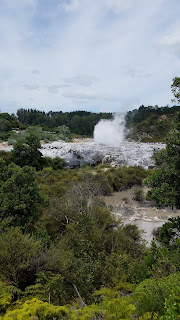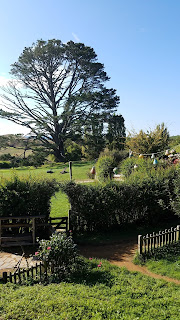Hello! Welcome to my final blog post.
Now that you’ve read about my experiences, do you think you have what it takes to be a global student teacher? It takes A LOT. You have to:
- Learn English all over again. It’s spoken in a different accent with a different vocabulary and different spellings. It DOES take some time to learn.
- Become familiar with a new language. Chances are if you’re outside of the United States and the country you are in knows English, they will also have a secondary language that is popular and widely known. In New Zealand, it was the Mauri language that was integrated into school and life.
- Assimilate to a new culture. Forget the way you thought you held a fork, another culture will do it differently. There will be all sorts of cultural norms and differences that will lead to misunderstandings you will have to communicate your way through.
- Convert everything. The electrical outlets. The temperature. Weights. Distances. The time difference between where you are and you home country. There’s always something happening in a unit you’re not used to.
- Try new foods. The diet of every culture is slightly different. If you’re going to survive, you’re probably going to have to make some changes to your diet. For example, I only had peanut butter twice while I was in New Zealand (people in the US are shocked, I know).
- Learn a new geography. Towns, cities, lakes, oceans, mountains, and where they are positioned in relation to each other will take some time to learn.
- Become an expert in public transportation. Chances are you won’t have access to a car, so you will need to figure out how to get places. Whether that means taxis, buying a bus ticket, or walking an hour to get somewhere for free, you need to plan ahead in order to get there and back.
- Build a local support system. You’ll always have your people back home to lean on, but it’s important to build a support system with people who are actually in the same place as you. Time zone changes and busy schedules sometimes make it difficult to communicate with people back home, and you’ll need someone to talk to who can relate to your experience abroad.
And I haven’t even gotten to the teaching part yet. In the schools, you’re going to need to:
- Learn a new school structure. Forget the way schools you’ve been in work, abroad they are going to have differences and you need to learn how schools are set up where you are.
- Learn a new curriculum. What schools teach and when they teach it will vary by country, and you are going to have to get used to a whole new set of rules and standards (or lack of them).
- Plan lessons that meet requirements of two countries. While you’re student teaching, you still need to meet Minnesota standards. It takes some extra planning to figure out how to do that while you’re still meeting the needs of your teacher and class.
- Build relationships with students of different backgrounds. You’re going to need to figure out how to connect with students who come from a different place and culture than you. The good news is kids are kids no matter where they are from, but you may need to change the way you ask questions or what you talk about in order to get the responses you are looking for.
- Have people observe you who don’t have your training. You will be formally observed by teachers who have been trained in education in the country they are in. They may not realize the differences between your education and theirs, so you may not initially meet their expectations.
- Be flexible. Things change in classrooms all the time. You may be asked to change your plans for the day or lead something that you’ve never done in the United States. It’s important that you are flexible to these changes and that you try your best.
- Ask questions. If you can’t ask for help or clarification when you need it, teaching anywhere would be tough. This is especially true if you’re teaching somewhere with cultural and societal differences from what you were trained for. ASK ASK ASK about anything and everything. The more you ask the more you can get a handle on this new style of doing everything.
So what do you think? Are you cut out for global student teaching? If that list seemed a little intimidating, let me help you answer that question. If you:
- Like challenges
- Enjoy learning new things
- Work hard
- Are passionate about helping students
- Love teaching
- Are open to new ideas
- Have a positive mindset
- Communicate well with others
- Can adapt to new situations
then you would make an excellent global student teacher. Don’t get me wrong, it’s not easy. But I believe we grow the most from the experiences that are difficult, challenge our views and beliefs, and get us outside our comfort zones. That’s exactly what global student teaching did for me. And it’s what it could do for you.
The final week of my placement absolutely FLEW by… I spent the week doing a lot of reflection about my time in New Zealand and enjoying being with my students (who I already miss). I could not be more thankful for this experience. I am not the same person or teacher I was when I got to New Zealand. It was an absolute pressure cooker at times and I wasn’t sure if I would make it through in moments, but it created change within myself and my practice. Here are some of the skills I gained which will help me in my classroom next year:
- Confidence. At the beginning of my experience, I would look to my cooperating teacher when faced with a tough decision in class. By the end, I felt like I was able to use my professional judgement in the moment and debrief about the decision after.
- Questioning. I learned how to ask open questions that deepen student learning and to actually explore student answers even if they took a turn I wasn’t expecting.
- Collaboration. Working in a collaborative classroom really taught me how to work with other teachers and develop things together. My ideas were usually better when I ran them by someone else first.
- Flexibility. I always thought I could go with the flow pretty well, but this experience made me continue to work on that skill. Things would change last minute, adjustments would have to be made, and school would carry on. I got pretty good at thinking on my feet.
It’s so rewarding to think back to where I started and see where I have come. Before I go, I wanted to share the highs and lows from my New Zealand experience. Let’s start with the lows.
Bottom 5 New Zealand Experiences:
1. Having my luggage fly to Houston when I flew to San Francisco. It only took a day to get to me, but it was still inconvenient.
2. Walking for hours with blisters on the bottom of my feet. I got blisters on the BOTTOM of my feet one weekend, and we didn’t have a car, so I had to walk for about an hour at least four different times on them. It was AWEFUL!
3. Bussing to Taupo from the north. There was an overnight bus that we often caught back to Taupo after a weekend away. It came through at night, getting to Taupo around 12:30am. About 5 north of Taupo, the bus always stopped at a convenience store so the driver could have a 30 minute break. It was torture being so close to town but having to wait for so long.
4. Overnight bus to Wellington. The only time I got any sort of motion sick was on this bus. When we got into Wellington traffic, the driving got really jerky and it didn’t sit well with me. I thought I was going to puke, but I held it in and felt better once I was off the bus.
5. Dunedin hostel. It was a sketchy situation. If you don’t know what I’m talking about, read my last post for more information.
And now let’s move on to the highlights!
Top 5 New Zealand Experiences:
1. Sunsets. Over mountains, lakes, and trees. Need I say more????
2. Zip lining and canyon swinging. It was epic.
3. My students. Getting to know them was a definite highlight. They brought so much personality, joy, laughter, and challenge to every day and I loved it!
4. Scenery. Vast and everchanging, it never got old to look at. It was a change from Minnesota for sure.
5. People. I met a lot of amazing people who shaped my experience, and I am grateful for my interactions with each and every one of them.
Thanks for reading about my experiences, it means a lot to me that you took time out of your day to see what I’ve been up to! Now that I’m done with student teaching, it is on to graduation and getting ready to have my own classroom next fall!!
























